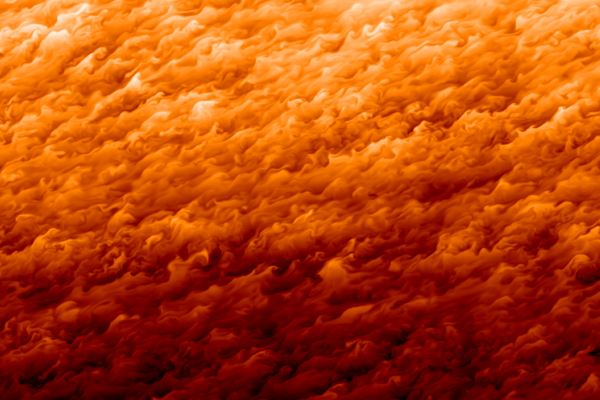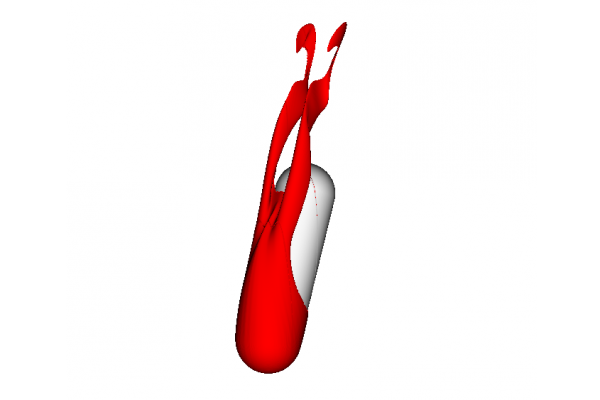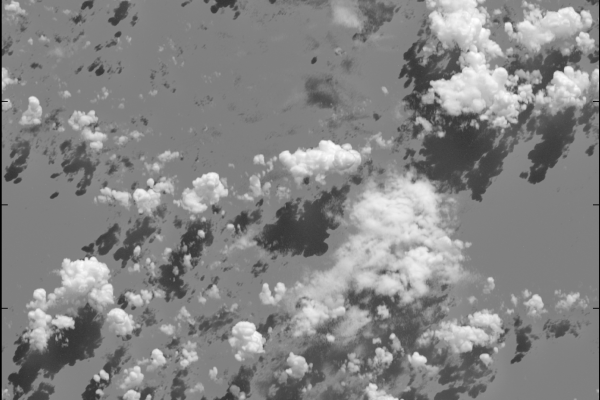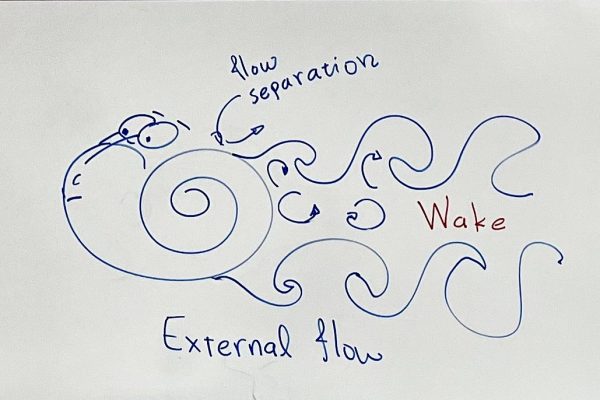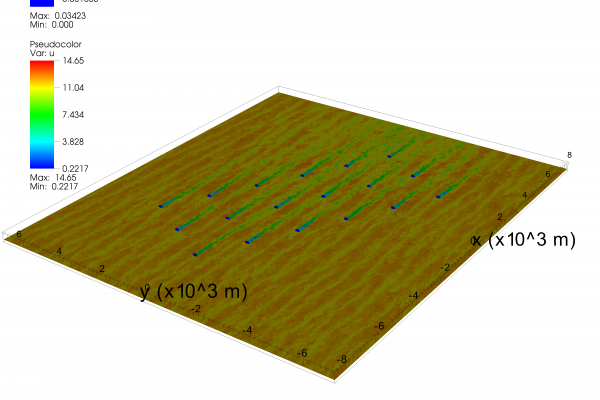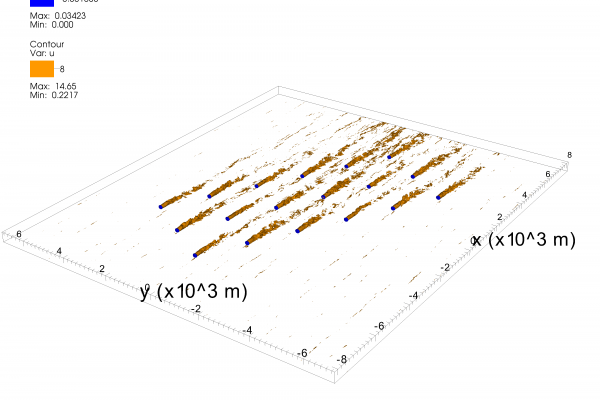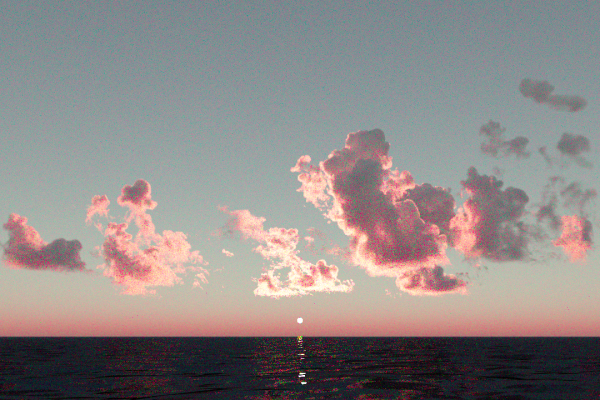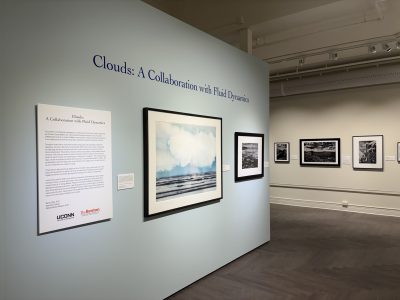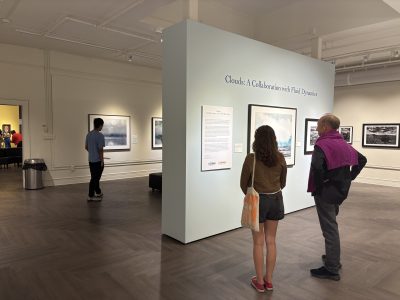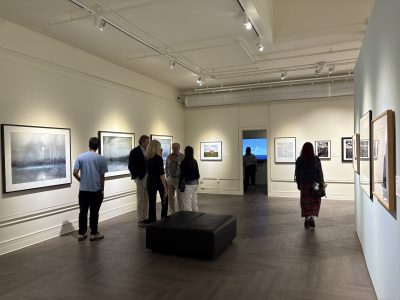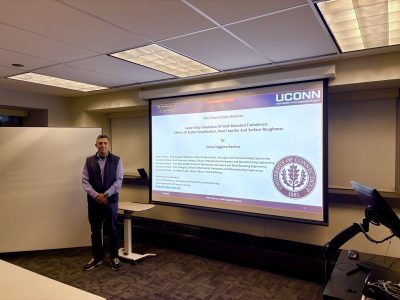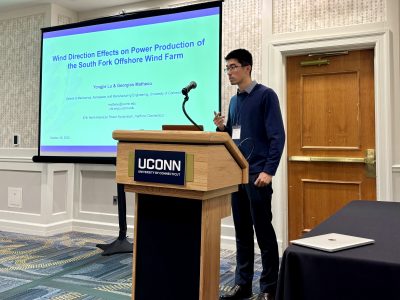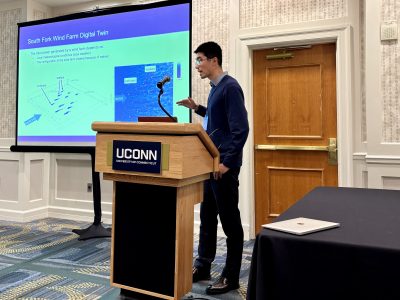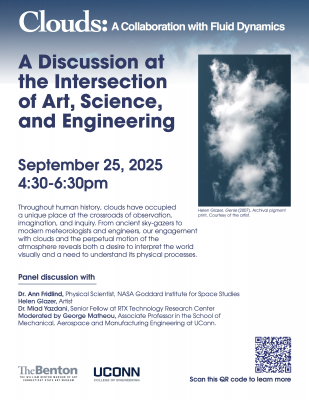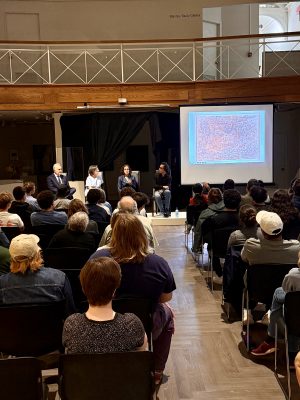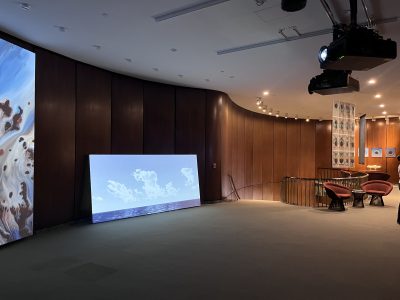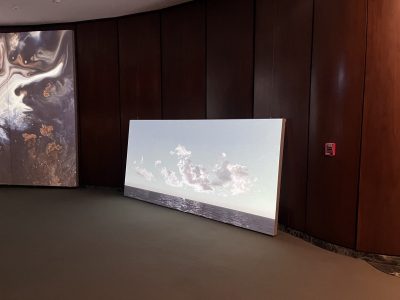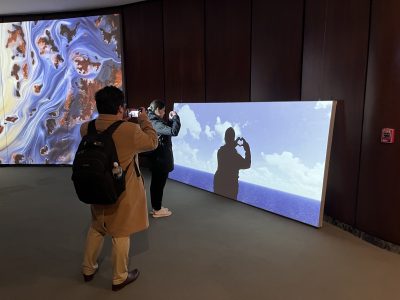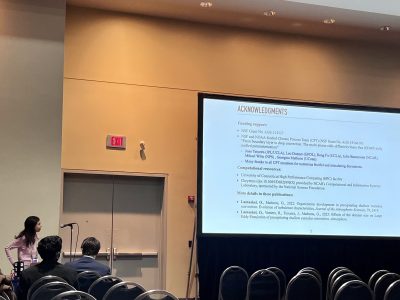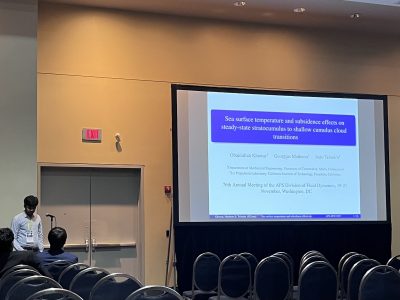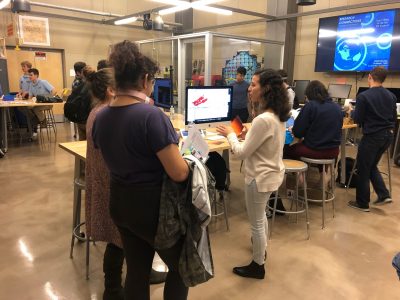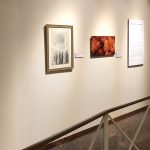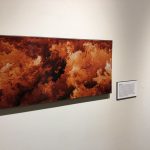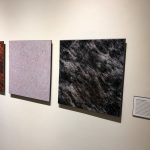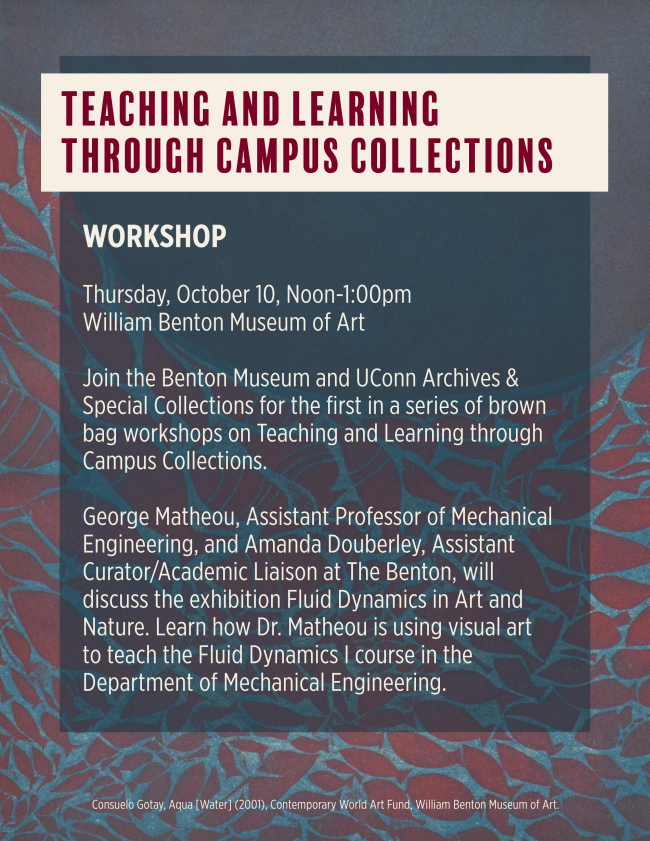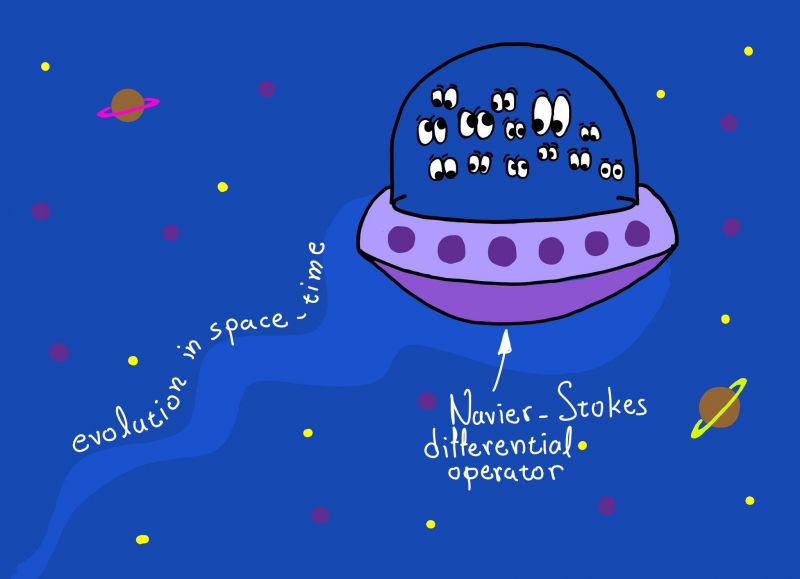Dr. George Matheou
| Phone: | (860) 486-8729 |
|---|---|
| E-mail: | matheou@uconn.edu |
| Address: | Pratt and Whitney Engineering Building (PWEB), Room 384. School of Mechanical, Aerospace, and Manufacturing Engineering, Storrs, CT 06269 |
Our Group
This is the group of Dr. Georgios “George” Matheou in the Department of Mechanical Engineering. Our mission is to provide world-class education, engage and inform the general public, and solve significant problems using computational science to make a positive impact on society and the environment.
News
Now: Cloud Art Exhibition!
Article in The Daily Campus about our exhibition.
Second, concurrent art exhibition!
We are excited to share that our cloud videos are featured in a second, concurrent art exhibition!
They are currently on view at the Nicole Longnecker Gallery in Houston, Texas, as part of Fluid Motion: The Coexistence of Order and Chaos. The exhibition is organized by the American Physical Society’s Division of Fluid Dynamics (APS-DFD), with support from the National Science Foundation (NSF).
Many thanks to APS-DFD, the organizers and curators of the Gallery of Fluid Motion, and Nicole Longnecker Gallery!
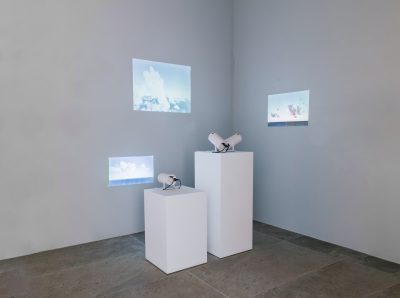
Photograph credit: Os Galindo
November 2025: Congratulations Dr Banhos!
Congratulations to Dr. Jonas Banhos for successfully passing his PhD defense! We could not be happier and more proud! Many thanks to all the amazing members of Jonas’s committee for their mentorship and guidance.
28 October 2025: Paper presentation at the 57th North American Power Symposium (NAPS) 2025
Yongjie Lu presented his paper on the impact of wind direction on the power generation potential of the South Fork Wind Farm at the 57th North American Power Symposium (NAPS). Yongjie combined advanced numerical modeling techniques and historical meteorological observations to show that a small rotation of the wind farm layout could have resulted in a 30% increase in power production.
25 September 2025: Clouds Panel: A discussion at the intersection of art, science, and engineering
In conjunction with the Clouds art exhibition, we organized a panel discussion at the intersection of art, science, and engineering. The program offered a rare opportunity to hear from an artist, a scientist, and an engineer in one conversation. The panelist were:
Article in The Daily Campus about the panel discussion: A scientist, artist and engineer walk into a room
July 2025: Group Social
On a warm summer day we did a cool social activity! Enjoy Yongjie’s well-balanced toe side turns and Aidan’s chill out style!
October 2024: Girl Scout Troop 10475 lab visit
We hosted Girl Scout Troop 10475 from Ellington, CT and talked about wind energy and the environment. Yongjie Lu, a graduate student in our group, is helping the scouts explore flow visualization of simulations of the South Fork offshore wind farm. 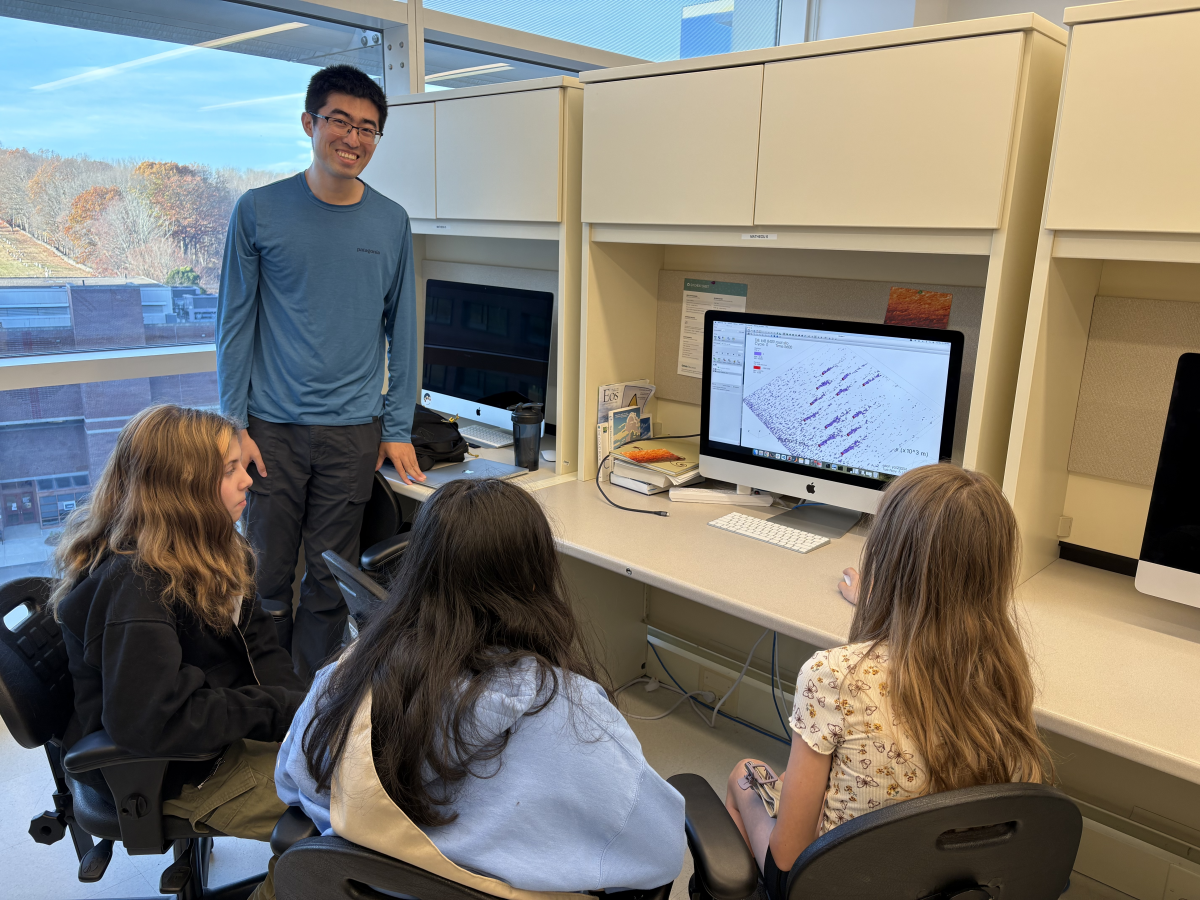
March 2024: Forecasting Wind Energy
University Communications produced a great video highlighting our work on wind energy! We are very grateful to the Eversource Energy Center for supporting this research.
October – February 2024: Art Exhibit at the National Academy of Sciences
The American Physical Society and the Cultural Programs of the National Academy of Science are organizing an art exhibition inspired by fluid dynamics, the discipline that describes the flow of liquids and gases. We are one of eleven fluid-dynamisists-turned artists whose videos of clouds were selected for the exhibit. The exhibit catalog is here.
January 22, 2024: Rare inside look at UConn’s High Performance Computing
A few of us and a videographer from UConn’s Office of Communications visited the computer room that houses the High Performance Computer we use for most of our computer simulations. Here are some pictures!
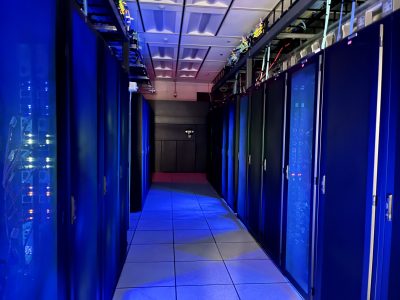
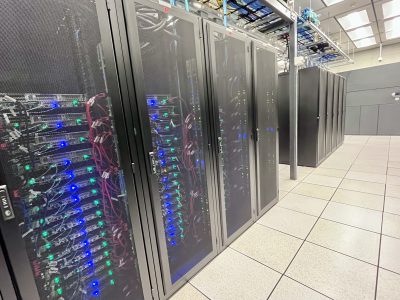
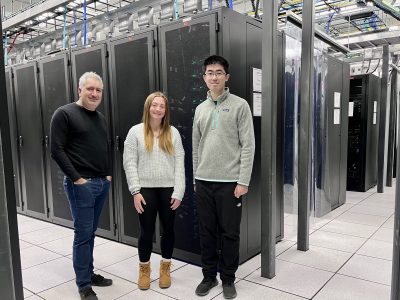
November 2023: 76th Annual Meeting of the American Physical Society, Division of Fluid Dynamics
Oumaima and Obudullah presented their research at the APS DFD Meeting in Washington, DC:
O. Lamaakel, J. Teixeira, R. Venters, G. Matheou, 2023: Computational domain size effects on large-eddy simulations of precipitating shallow cumulus convection, Abstract: L20.00006
O Khawar, G. Matheou, and J. Teixeira, 2023: Sea surface temperature and subsidence effects on steady-state stratocumulus to shallow cumulus cloud transitions, Abstract: L20.00004
August 2023: Congratulations Dr Lamaakel!
Congratulations to Dr. Oumaima Lamaakel for successfully passing her PhD defense! We could not be happier and more proud! Many thanks to all the amazing members of Oumaima’s committee for their mentorship and guidance. Oumaima is continuing her research journey as a Postdoctoral Scholar at NASA’s Jet Propulsion Laboratory. 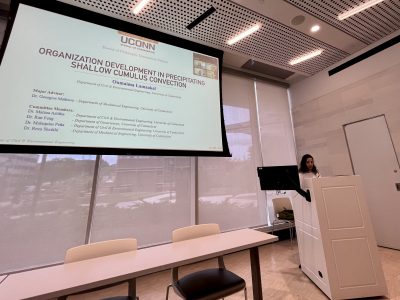
June 2023
We were thrilled to join friends and colleagues in Boulder, CO for the CESM workshop. Many thanks to NCAR CGD and everyone else who organized the workshop. In the picture is Oumaima and Obaidullah with their poster.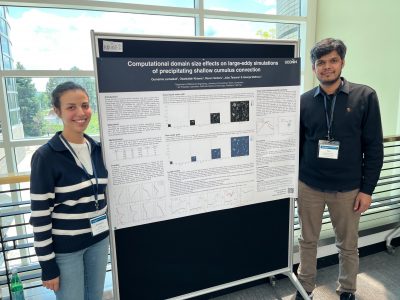
…and a few more papers published since our last update:
Lamaakel, O., R. Venters, J. Teixeira, and G. Matheou, 2023: Computational domain size effects on large-eddy simulations of precipitating shallow cumulus convection, Atmosphere 14 (7), 1186
Chinita, M. J., M. Witte, M. J. Kurowski, J. Teixeira, K. Suselj, G. Matheou, P. Bogenschutz, 2023: Improving the representation of shallow cumulus convection with the Simplified Higher-Order Closure Mass-Flux (SHOC+ MF v1. 0) approach, Geoscientific Model Development, 16 (7), 1909–1924.
Matheou, G., 2022: Large-eddy simulation of cumulus clouds, Physical Review Fluids, 7, 110507.
June 21: A Wave of New Papers
Four new papers were published or accepted recently. The papers are published in the Journal of Atmospheric Sciences, Monthly Weather Review, and the Quarterly Journal of the Royal Meteorological Society.
Lamaakel, O. and G. Matheou, 2022: Organization development in precipitating shallow cumulus convection: Evolution turbulence characteristics, Journal of the Atmospheric Sciences, 79, 2419–2433.
Witte, M. K., A. Herrington, J. Teixeira, M. J. Kurowski, M. J. Chinita, R. L. Storer, K. Suselj, G. Matheou, and J. Bacmeister, 2022: Augmenting the double-Gaussian representation of atmospheric turbulence and convection via a coupled stochastic multi-plume mass flux scheme, Monthly Weather Review, 150, 2339–2355
Chinita, M. J., G. Matheou, and P. Miranda, 2022: Large-eddy simulation of very stable boundary layers. Part I: Modeling methodology, Quarterly Journal of the Royal Meteorological Society, 148, 1805–1823.
Chinita, M. J., G. Matheou, and P. Miranda, 2022: Large-eddy simulation of very stable boundary layers. Part II: Anisotropic turbulence structure, Quarterly Journal of the Royal Meteorological Society, 148, 1824–1839.
December 10: APS/DFD Gallery of Fluid Motion Award
Our video entry in the Gallery of Fluid Motion of the 2021 APS DFD has won the Gallery of Fluid Motion Award.
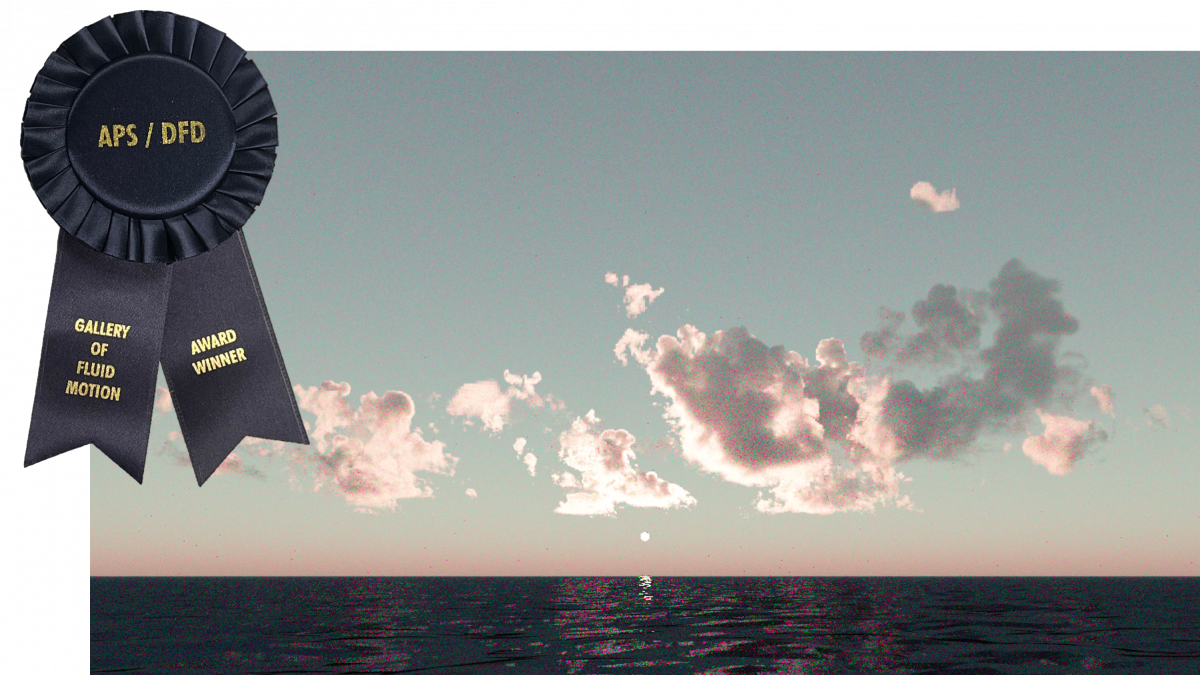
The video is available here:
The video shows a simulation of a cumulus-topped trade wind atmospheric boundary layer observed during the Barbados Oceanographic and Meteorological Experiment (BOMEX). The video demonstrates the fidelity of modern computational methods for the simulation of clouds and atmospheric turbulence. These simulations help address important questions in environmental fluid dynamics and atmospheric science, and help improve weather forecasts and climate projections.
December 8: New Paper!
Methane is a nasty greenhouse gas! An Artificial Intelligence-based method is developed to quantify methane leaks. The method combines large-eddy simulations, a convolutional neural network model, and airborne observations to find methane leaks. Many thanks to our collaborators at Caltech and JPL and Siraput for all his hard work!
Jongaramrungruang, S., A. K. Thorpe, G. Matheou and C. Frankenberg, 2022: MethaNet – An AI-driven approach to quantifying methane point-source emission from high-resolution 2-D plume imagery, Remote Sensing of Environment, 269, 112809
December 1: 74th Annual Meeting of the American Physical Society, Division of Fluid Dynamics
Ravon and Oumaima presented their research at the 2021 APS DFD meeting.
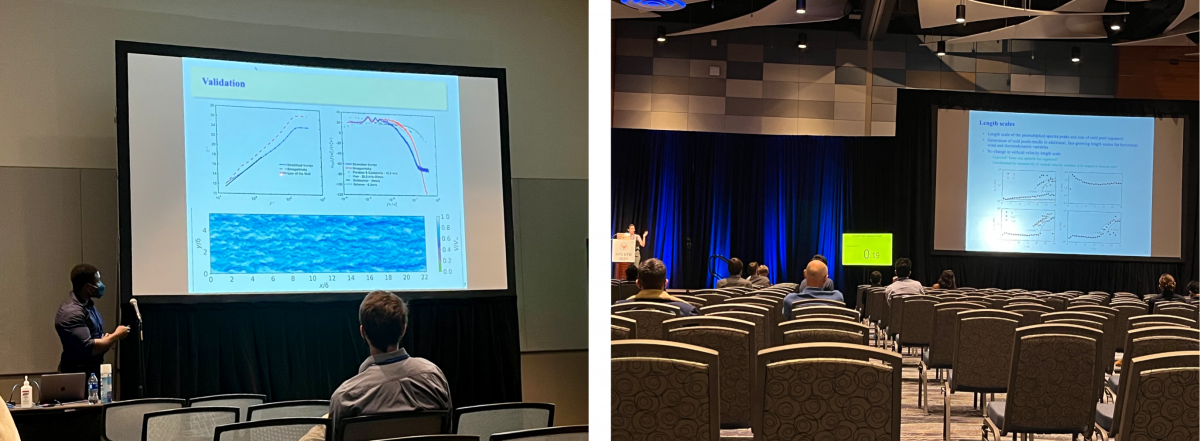
October 29: Upcoming Conferences
We are presenting papers in the upcoming APS DFD and AGU Fall meetings.
74th Annual Meeting of the APS Division of Fluid Dynamics:
Lamaakel., O. and G. Matheou, Large-scale organization development in precipitating shallow cumulus convection, APS DFD 2021, M02.00007
Venters, R. and G. Matheou, Wall-pressure fluctuations in a turbulent boundary layer: a comparison of two LES models, APS DFD 2021, M08.00003
AGU Fall Meeting 2021:
Herrington, A., M. Witte, J. Teixeira, J. Bacmeister, M. Kurowski, M. Chinita, R. Storer, K. Suselj and G. Matheou, Improving on the representation of subtropical clouds in the Community Atmosphere Model using CLUBB+MF, AGU Fall Meeting, OS45E-1188
Matheou, G. and O. Lamaakel, Growth rates of turbulence length scales in precipitating shallow cumulus convection, A24F-06.
Chinita, M., M. Witte, M. Kurowski, J. Teixeira, K. Suselj and G. Matheou, Improving shallow convection in the simple cloud-resolving E3SM atmosphere model with the stochastic multi-plume mass-flux parameterization, A43D-04
Witte, M., A. Herrington, J. Teixeira, M. Kurowski, M. Chinita, R. Storer, K. Suselj, G. Matheou and J. Bacmeister, Augmenting the double-Gaussian representation of atmospheric turbulence and convection via a coupled stochastic multi-plume mass flux scheme, A25N-1864
October 7: Research Connections
Come meet us and learn about research at Research Connections on Friday, October 15, 2–4 pm at the Werth Residence Tower. Research Connections is a networking event intended to expose first and second year students to undergraduate research through engaging in meaningful interactions with faculty, staff, graduate students, and peers. Research Connections is organized by the Office of First Year Programs & Learning Communities (FYP&LC), the Office of Undergraduate Research for organizing the even!
September 30: Art & Teaching
We participated in “Teaching Is A Work Of HeArt” at the William Benton Museum of Art at TA/GA meet and greet across disciplines. Cosponsored by UConn’s Center for Excellence in Teaching and Learning and the William Benton Museum of Art.
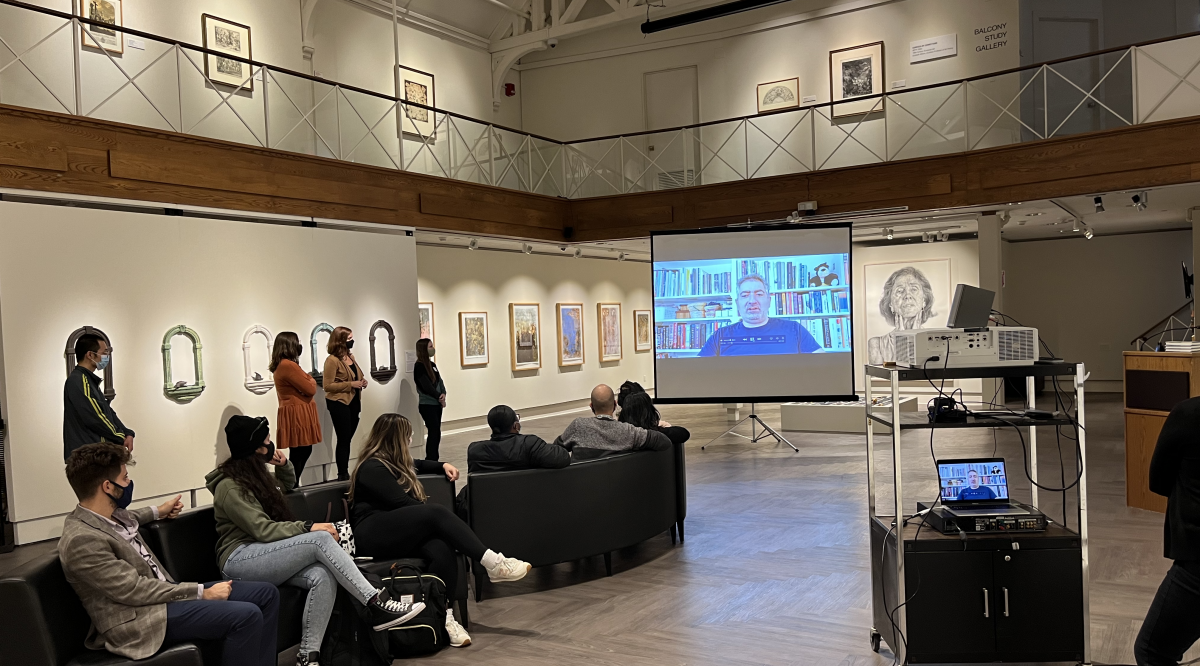
July 13: GABLS4 LES Model Intercomparison Paper
The paper documenting the GABLS4 LES Model Intercomparison study has been published Boundary Layer Meteorology! Our LES model is one of ten models that contributed simulations to model a very stable Antarctic boundary layer. “GABLS4” is an interesting acronym: it is the Fourth GEWEX Atmospheric Boundary Layer Study, and GEWEX is the Global Energy and Water Exchanges project, which is as part of the World Climate Research Programme (WCRP). So, we contributed our LES to GABLS4, which is part of GEWEX under WCRP.
December 16: AGU Fall Meeting 2019
We participated in the AGU Fall Meeting with several presentations:
Monday, December 9
Residual Cross-Grid Flow Numerical Error in Large-Eddy Simulations of Cumulus-Topped Boundary Layers (A13N-3131)
Oumaima Lamaakel and Georgios Matheou
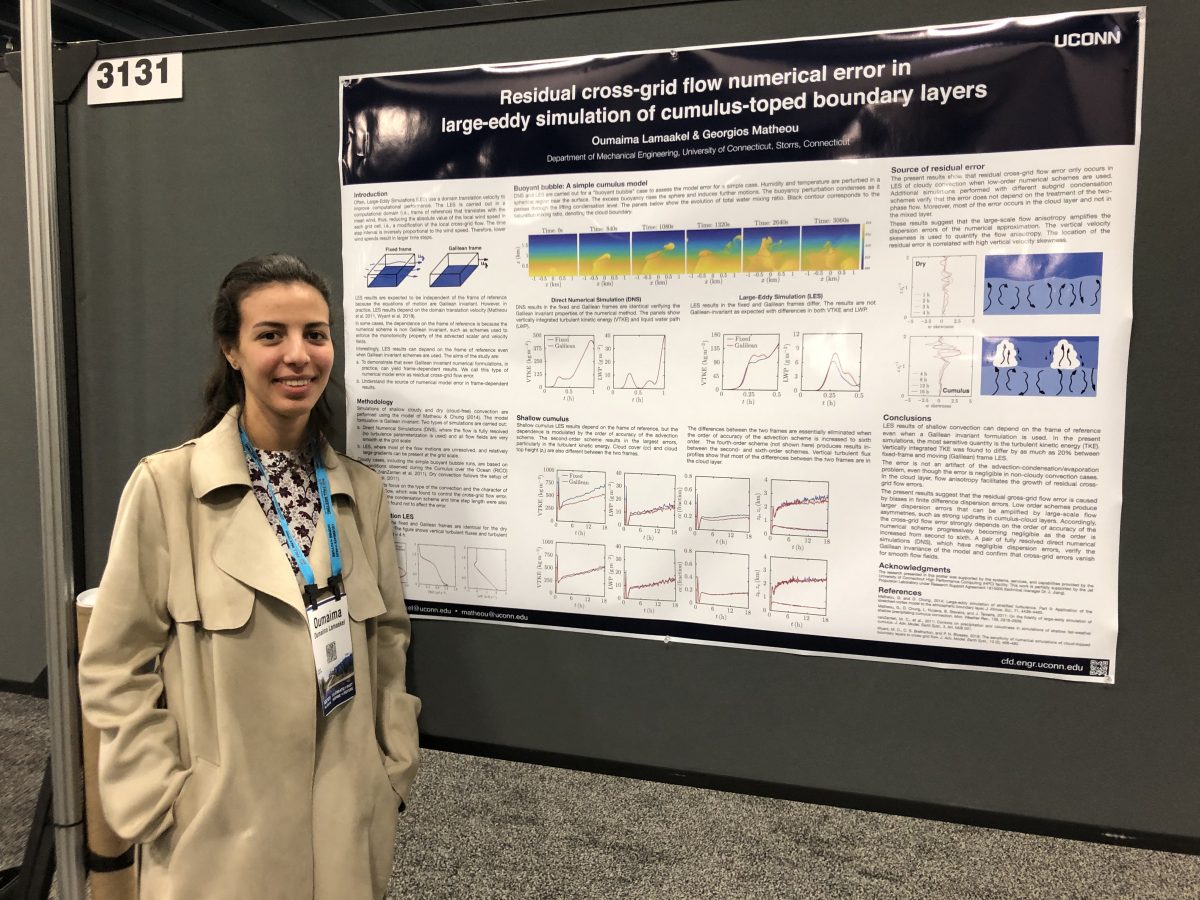
Infrared Instrument Radiance Modeling from Large Eddy Simulations to Access Sensitivity to Marine Planetary Boundary Layer Processes (A11T-2827)
Evan Fishbein, Bjorn Lambrigtsen, Matthew D. Lebsock, Georgios Matheou, Vivienne Payne, Mathias M. Schreier, Joao Teixeira, and Robert C Wilson
Inherent Properties of Clouds in the PBL Derived from Multi-angle Spectro-Polarimetric Imaging at the “Edge of Space:” New Capabilities of JPL’s AirMSPI Sensor on NASA’s Airborne ER-2 Platform (A11T-2828 )
Anthony B. Davis, Feng Xu, Gerard van Harten, David J. Diner, Aviad Levis, Yoav Y. Schechner, and Georgios Matheou
Wednesday, December 11
Boundary Layer Clouds and Climate: From LES to Simple Models (A32E-01)
Joao Teixeira, Georgios Matheou, Daniel Chung, and Peter Kalmus
Thursday, December 12
The spiderweb structure of stratocumulus clouds (A41Q-2873)
Georgios Matheou, Anthony B. Davis, and Joao Teixeira
December 6: An Art and Science Collaboration
Jonathan Goodrich and Liam McNeece two creative and talented students in Digital Media and Design created an informative and engaging animation to describe the dynamics of stratocumulus clouds. The animation was created in the Scientific Visualization class taught by Prof. Anna Lindemann. The animation seamlessly integrates Jonathan’s and Liam’s illustrations/animations with a movie from a high-resolution simulation of a stratocumulus cloud with our group’s large-eddy simulation model.
November 18: Weather and Art!
We visited Ms Govoni’s 7th Grade Art Class at Parish Hill High School and discussed clouds and weather. Inspired by our conversation, images and movies, students created marble art. Marble art has a striking resemblance to the Earths’s atmospheric motions: behaves like a two dimensional fluid with very little horizontal mixing. (more pictures coming soon!)
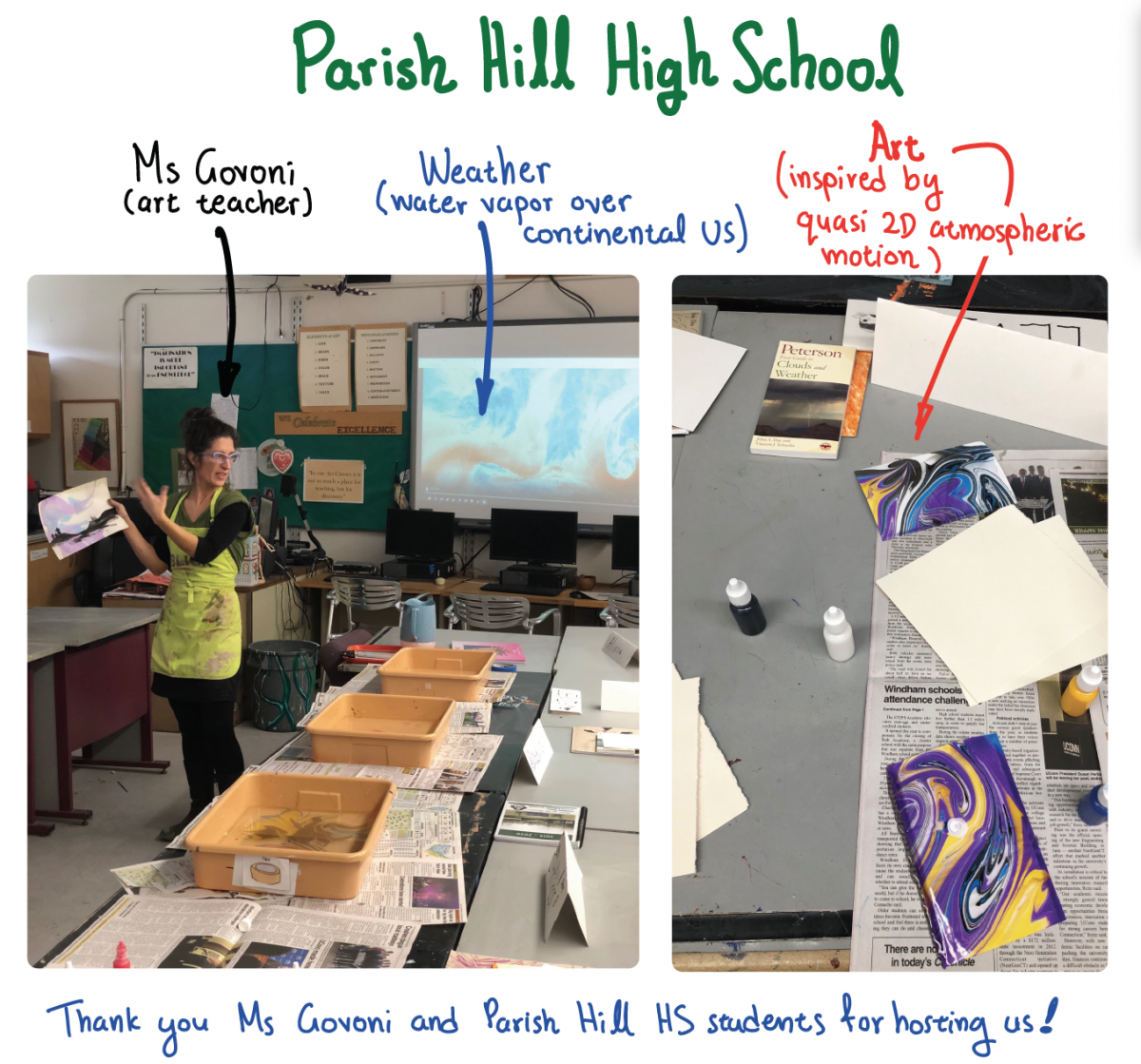
October 16
Our group participated in Research Connections 2019, a networking event at UConn intended to expose first and second year students to undergraduate research through engaging in meaningful interactions with faculty, staff, graduate students, and peers. Below, Oumaima Lamaakel, a graduate student in our group, is discussing her high resolution simulations of clouds and atmospheric dispersion. Many thanks to the Office of First Year Programs & Learning Communities (FYP&LC), the Office of Undergraduate Research for organizing the even!
Art and Science!
As part of the Fluid Dynamics I course, the Fluid Dynamics in Art and Nature exhibition (August 23 – October 13, 2019) at the Benton Museum of Art explores the intersection of art and science by bringing together works of art from the Benton Museum’s collection with computer simulations of natural phenomena. The exhibition aims to promote creativity, critical thinking, and self-learning. Fluid Dynamics in Art and Nature is curated by Dr. Matheou, and Dr. Amanda Douberley, Assistant Curator/Academic Liaison, Willian Benton Museum of Art.
Benton Museum Workshop: Thursday, October 10 at noon
Please join us tomorrow (March 17) at the #APSSummit25 for our talk on clouds and turbulence in the atmosphere. Session MAR-B45 in 263A at 11:42 am. Most of our talk is for non-experts in the field: we will review some of the fundamentals, provide historical perspective and
We are excited to present an invited talk at the APS Global Physics Summit 2025 next week! We are discussing our favorite topics: clouds ☁️ and turbulence 🍥 Monday March 17 in Session MAR-B45, Anaheim Convention Center, 263A (Level 2). The Session is sponsored by the Topical
For those attending the #AGU24 we have a poster today, Tuesday, Dec 10 about one of our favorite topics: clouds ☁️☁️☁️!!! Poster session A21C-1707: "The long road to equilibrium: Temporal scaling of marine boundary layers"
one more latte …ahem, excuse me, buoyant convection simulation, for all coffee lovers out there ☕️
as in the previous post, code, simulation and visualization by our student @jacobjivanov ☕️☕️☕️
@CFDonia @DanielleFong @jacobjivanov Live footage frothing milk for a latte
